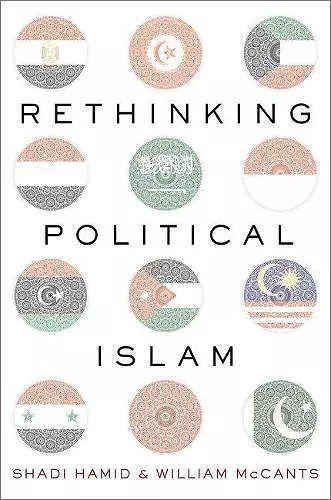Rethinking Political Islam
Shadi Hamid editor William McCants editor
Format:Hardback
Publisher:Oxford University Press Inc
Published:7th Sep '17
Currently unavailable, and unfortunately no date known when it will be back
This hardback is available in another edition too:
- Paperback£25.99(9780190649203)

For years, scholars hypothesized about what Islamists might do if they ever obtained power. Now, academics and Islamists alike finally have answers. And they are confusing. In the Sunni hinterland between Syria and Iraq, ISIS established a government by brute force, implementing an extreme interpretation of Islamic law. On the opposite end of the spectrum, Tunisia's Ennahda Party governed in coalition with two secular parties, ratified a liberal constitution, and voluntarily stepped down from power. In Egypt, the Muslim Brotherhood lasted in power for a year, alienating most of the country's major political forces before being overthrown in a military coup. The twin shocks of the Egyptian coup and the rise of ISIS have challenged conventional wisdom on political Islam, forcing a rethinking of some of the basic assumptions of, and about, Islamist movements. However, while ISIS and other jihadist groups garner the most media attention, the vast majority of Islamists are of the mainstream variety, seeking gradual change and participating in parliamentary politics (when they're allowed to). In Rethinking Political Islam, two of the leading scholars on the topic, Shadi Hamid and William McCants, have gathered a group of leading specialists in the field to consider the phenomenon, and focus in particular on mainstream political Islamist groups. As Hamid and McCants argue, they not only represent the future of political Islam, but they also provide a fascinating window into a rapidly changing Middle East. It will be the first book to systematically assess the evolution of mainstream Islamist groups across 12 country cases-Egypt, Tunisia, Morocco, Syria, Yemen, Libya, Saudi Arabia, Kuwait, Jordan, and Pakistan, Malaysia, and Indonesia. In each of these cases, the contributors consider how Muslim Brotherhood and Brotherhood-inspired Islamist movements are grappling with fundamental questions, including those about: gradual versus revolutionary approaches to change; the use of tactical or situational violence; attitudes toward the nation-state; and how ideology and political variables interact. Unlike most other projects on political Islam, this book includes three of the most important country cases outside the Middle East-Indonesia, Malaysia, and Pakistan-allowing readers to consider a greater diversity of Islamist experiences. Because the book takes seriously the notion that the only way to understand Islamists is by spending time with them, all of the contributors have immersed themselves...
This collection is a remarkable and probably unique overview, historically grounded but also looking towards the future of the conflict-torn Middle East. We are shown how the balance between religious, political and welfarist motivations for Islamist movements has been highly variable, but some recognition is allowed here, which many other commentaries withhold, of the long-standing element of ethics and public service. * Jonathan Benthall, Times Literary Supplement *
The contributors look at expressions of political Islam in 12 Middle Eastern countries with a view to highlighting the wide range of approaches adopted by Islamist actors, and the widely differing outcomes these approaches have produced. Space is given to the views of Islamist activists and leaders themselves. * Survival: Global Politics and Strategy Vol.60.2 *
ISBN: 9780190649197
Dimensions: 160mm x 236mm x 28mm
Weight: 698g
398 pages